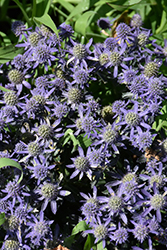Blue Hobbit Sea Holly
Eryngium planum 'Blue Hobbit'
Plant Height: 12 inches
Flower Height: 18 inches
Spacing: 10 inches
Sunlight:
![]()
Hardiness Zone: 4a
Other Names: Flat Sea Holly, Tetra Petra
Description:
A most compact sea holly with unusual and show-stopping prickly steel-blue flowers with darker blue stems, thistle-like; tolerates hot dry sites; attractive to butterflies; pair up with softer textured plants, beautiful in dried arrangements
Ornamental Features
Blue Hobbit Sea Holly features bold clusters of steel blue ball-shaped flowers with silver bracts at the ends of the stems from early summer to early fall. The flowers are excellent for cutting. Its attractive spiny lobed leaves remain silvery blue in colour throughout the season. The royal blue stems are very colorful and add to the overall interest of the plant.
Landscape Attributes
Blue Hobbit Sea Holly is an herbaceous perennial with a mounded form. Its relatively fine texture sets it apart from other garden plants with less refined foliage.
This plant will require occasional maintenance and upkeep, and is best cleaned up in early spring before it resumes active growth for the season. It is a good choice for attracting butterflies to your yard. Gardeners should be aware of the following characteristic(s) that may warrant special consideration;
- Self-Seeding
Blue Hobbit Sea Holly is recommended for the following landscape applications;
- Mass Planting
- Hedges/Screening
- Rock/Alpine Gardens
- Border Edging
- General Garden Use
- Container Planting
Planting & Growing
Blue Hobbit Sea Holly will grow to be about 12 inches tall at maturity extending to 18 inches tall with the flowers, with a spread of 12 inches. When grown in masses or used as a bedding plant, individual plants should be spaced approximately 10 inches apart. Its foliage tends to remain dense right to the ground, not requiring facer plants in front. It grows at a medium rate, and under ideal conditions can be expected to live for approximately 10 years. As an herbaceous perennial, this plant will usually die back to the crown each winter, and will regrow from the base each spring. Be careful not to disturb the crown in late winter when it may not be readily seen!
This plant should only be grown in full sunlight. It prefers dry to average moisture levels with very well-drained soil, and will often die in standing water. It is considered to be drought-tolerant, and thus makes an ideal choice for a low-water garden or xeriscape application. It is particular about its soil conditions, with a strong preference for poor, alkaline soils, and is able to handle environmental salt. It is highly tolerant of urban pollution and will even thrive in inner city environments. This is a selected variety of a species not originally from North America. It can be propagated by cuttings; however, as a cultivated variety, be aware that it may be subject to certain restrictions or prohibitions on propagation.
Blue Hobbit Sea Holly is a fine choice for the garden, but it is also a good selection for planting in outdoor pots and containers. It is often used as a 'filler' in the 'spiller-thriller-filler' container combination, providing a mass of flowers and foliage against which the thriller plants stand out. Note that when growing plants in outdoor containers and baskets, they may require more frequent waterings than they would in the yard or garden. Be aware that in our climate, most plants cannot be expected to survive the winter if left in containers outdoors, and this plant is no exception. Contact our experts for more information on how to protect it over the winter months.
This plant may not be hardy in our region, and certain restrictions may apply. Please contact the store for further details.

